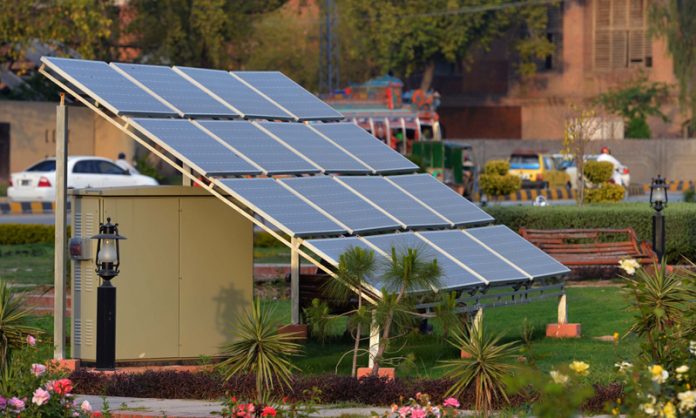ISLAMABAD: Sensing the likely failure in getting rid of the load-shedding, the government is now all set to launch a media campaign to convince the public to install a solar system at home level to overcome the prevalent energy crisis.
Surprisingly, Pakistan Muslim League-Nawaz government during the last year of its constitutional tenure is now ready to launch a campaign asking the public to use self-generated electricity and also sell the surplus to the electric distributing company (DISCO) under the already introduced net metering system of electricity for consumers. Instead of completely removing faults of the power system by introducing much-needed reforms, upgrading the power system and putting an end to electricity crisis, the government’s expected decision of launching the campaign to convince the public is expected to raise many eye-brows as election 2018 is not far away but country is still faced with power outages. Also, the novel idea to launch this campaign will cost heavily to the national exchequers while consumers of electricity will have to invest in advance to use the net metering system.
Official sources on anonymity informed that the government has decided to launch a campaign about the utility of the net metering system of electricity for consumers on radio, television, newspapers, etc apparently to encourage people to adopt alternative means of energy, including solar and wind power. They said the campaign has been designed as necessary preparations have been done as per the instructions of authorities concerned to launch this campaign as audio, video and written material (pamphlets, placards, stickers etc) are ready to be made public. The novel idea to sell extra electricity by the consumers to the power distribution companies at lucrative rates through a campaign will hopefully persuade the public to invest Rs 5 to 6 lakh on own home and use the self-generated electricity and also sell the surplus to the electric supply company, said sources.
“Government has allocated sufficient funds for a campaign of the net metering system, which will be launched through advertisements on radio, TV and newspapers, social media forums etc., said an official of Energy Ministry on condition not to be named.
The official further said that net metering system has been introduced in all electricity supply companies (DISCOs) to facilitate power-producing customers and help overcome the unending power deficit in the country. They said the DISCOs have been offering to their consumers to produce electricity and sell the surplus to the company and established the one-window operation to process the applications of domestic and commercial users, seeking the two-directional meter to produce and sell electricity.
The two-directional meter records both the readings and at the end of the month the amount of the electricity sold to DISCO is deducted from the bill sent by a DISCO. And, if the amount is more than the use of the DISCO’s electricity by the user they will get a cheque within three months period, said officials.
“All customers of electricity can avail net metering facility and one window system is now fully functional for net metering where customers can submit their applications and have a free net metering connection in just three to four weeks,” the officials said.
It is to note here that the government has so far miserably failed in reining in load shedding despite a change in the weather and a remarkable dip in electricity demand amid the reports that load shedding is continuing from three to five hours in urban areas and four to six hours in rural areas.
Background interviews and discussions with energy experts disclosed that the net metering campaign has been designed to convince the common public to invest mainly on solar panel/system to avail the facility offered under the net metering system. And, the government has resorted to launching the campaign after finding failure in completing putting an end to the power load-shedding due to the system constraints. They said though the power sector has achieved surplus generation of electricity, however, old power generation, transmission and distribution network is unable to completely end the power outages in the country. The entire power system has become volatile especially with the functioning of new efficient power plants, they added.
Experts further said that the net metering system has appeared as an easy and prompt solution to the on-going power outages of the country to the government while it will benefit the electricity consumers directly and the power system will also be able to control the shortfall of electricity.
Most countries extensively use the net metering to either store energy and use it later, or sell it to the government in order to reduce the bills. They said the net metering system would encourage customers to use alternative means of electricity and sell the surplus to the government.
They were of the view that expenditures incurred on installation of the solar panels could be recovered within a period of five years in the form of money saved, which otherwise had to be paid on account of electricity bills to power distribution companies.
To a question about the pricing of a solar system with the capacity to generate one kilowatt (KW) electricity, they said, it would cost around Rs 150,000, while the system for three to five KW would be sufficient for an average house.
Under the system, smart meters are fixed at houses, departments, industries and organisations and the consumers are allowed to produce electricity. The success of net metering in Pakistan, however, has so far remained a mystery and only time will tell how useful it turns out to be, experts said.
Net metering is an electricity policy for consumers, who own / plan to set up a renewable energy facility, which allows them to produce electricity (using wind and solar) for their own use and supply the excess produce to the national grid setting-off units of electricity consumed during off-peak hours or at times when the production from renewable energy facility is not enough to meet the consumer load. The consumer will either pay a reduced utility bill or get paid for excess energy exported to the grid, as stated in the contract with the relevant DISCO.
NEPRA, in September 2015, issued its net-metering regulations that allow the DISCOs to purchase excess units of electricity produced by the consumers, and net them off against the units consumed from the grid. Renewable energy is a long-term power solution. The solar PV technology gives access to affordable electricity supply during system life.























